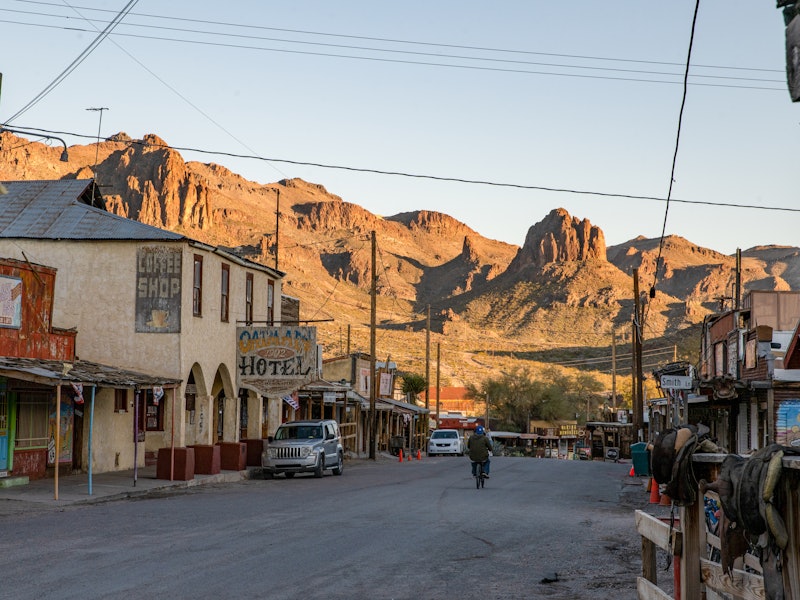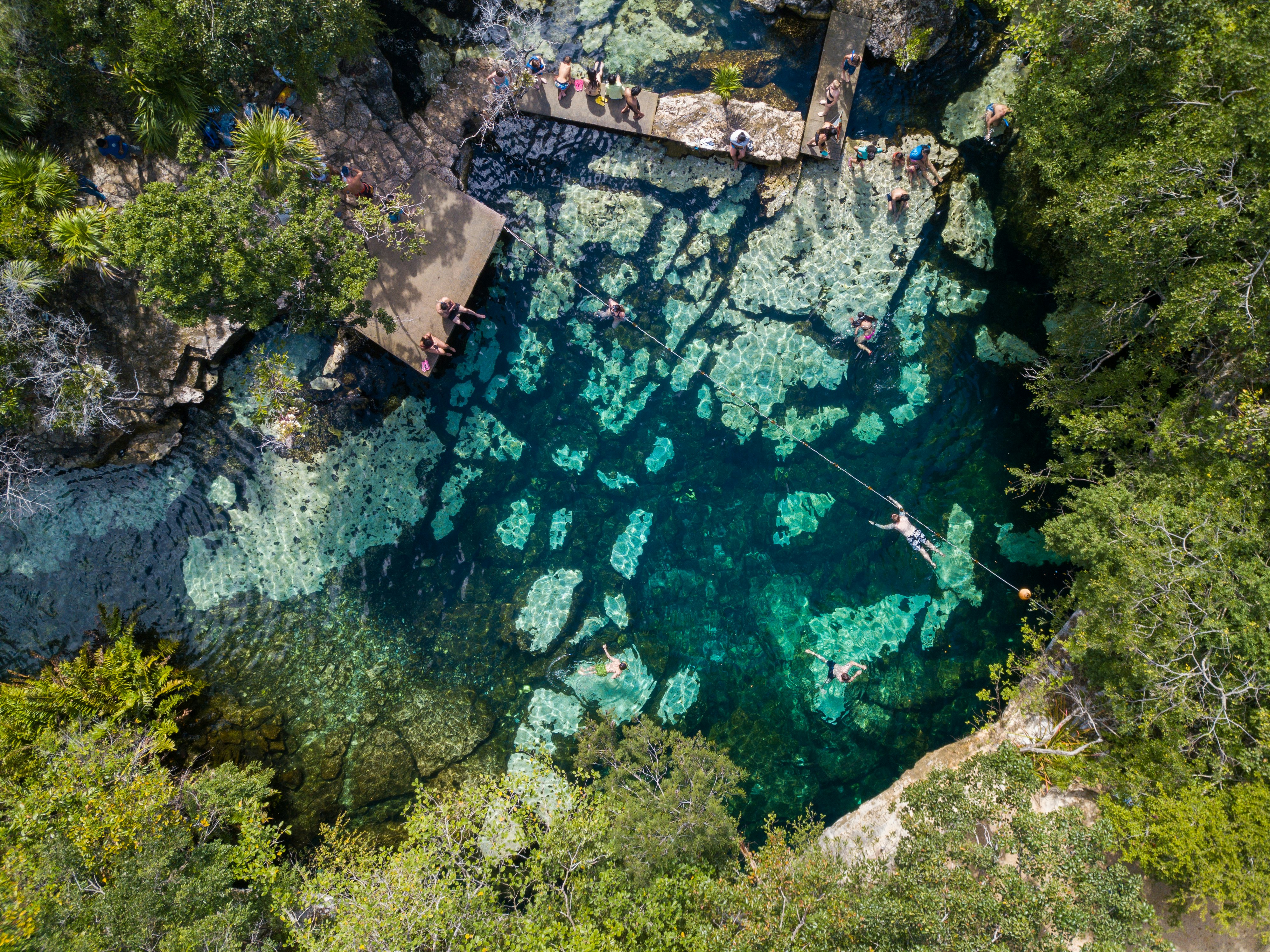
The 30 best countries, cities and regions to visit in 2025
Jan 2, 2025 • 9 min read

Zion National Park narrows. James O'Neil/Getty Images
Let’s talk about trips that are just downright deliciously indulgent. North America is a great place to start. Will this be the year you witness Yellowstone’s Old Faithful geyser shoot 180ft up into the air? Or will you see impressive carvings of the ancient world on the Yucatan Peninsula?
We’ve compiled 10 of the dreamiest adventures in North America from our new book, Dream Trips of the World, to inspire your next adventure.


There’s no American trip like a road trip. The mother of them all is Route 66 from Chicago to Santa Monica, cutting through the heart of the US on its way to the 'promised land' of California. While the original route has been mostly subsumed by modern highways, many sights remain – vintage gas stations and drive-in restaurants, blinking neon signs and kitsch roadside attractions. Endless prairie gives way to rolling hills, which lead to silvery high plains and scorched red desert.
The drive can feel surreal, miles of empty road punctuated by improbable sights. Outside Tulsa is an 80ft (24m) plaster whale beached in a pond. In Amarillo, there’s a field of Cadillacs buried nose-down in the earth. The natural splendor can feel equally surreal – the rainbow-colored fossilized trees of the Petrified Forest, the towering cacti of the Mojave Desert. By the time the Pacific appears, 2448 miles (3940km) into the drive, a simple road trip has become an epic journey.




Country singers know they’ve made it when they see their name in lights on venues in Nashville. 'Music City' draws both wannabe songwriters and music lovers from across the globe, eager to hear that unique Nashville sound at celebrated concert halls like the Ryman Auditorium and Grand Ole Opry, and famed recording studios. By night, visitors fill the well-worn dance floors of honky tonks as the next big thing takes to the stage.
A few hours west, music is the lifeblood of another venerable Tennessee town, Memphis – although here, that signature sound is the blues. There’s more music to be heard along US Rte 61, too. This is the so-called ‘Blues Highway,’ a 620-mile (1000km) route sprinkled with places that shaped America’s musical heritage.
New Orleans, the birthplace of jazz, is home to brassy clubs where the stages are packed with horn players weaving intoxicating tunes around the swaying crowds. Bayous and wetlands flank the towns west of the Crescent City – the heart of Cajun Country, where accordions and washboards replace trumpets and saxophones.

Nature has long had the upper hand in southern Utah’s Red Rock Country. The rippled gulches and wrinkled tablelands in this Martian wilderness are like a pop-up geological textbook. The place is a tumble – a chaos – of weird sedimentary slabs on top of way-out layers, and its seemingly eternal desert scapes appear sculpted with cinematic arches, tombstone mesas and slot canyons, as if a God had once swung a giant axe to gut the landscape.
Star billing goes to the appropriately named Mighty 5 – the honeypot landmarks of Arches, Bryce Canyon, Canyonlands, Capitol Reef and Zion National Parks. From behind the steering wheel, Utah’s most famous road, Scenic Byway 12, otherwise known as the 'Journey Through Time Scenic Byway,' connects the dots between much of the state’s most geologically immaculate terrain. This was once the land of the Ancestral Puebloans of the American West, and you’ll be blessed to step into it for a moment, leaving only footprints behind.




Spend just two days living the classic New York high life. Hit heritage department stores like Saks and Bergdorf Goodman, their perfumed aisles lined with silk scarves and crystal decanters. For lunch, a well-heeled New Yorker might choose an omakase (chef-curated) meal of just-flown-from-Tokyo sushi, a high tea of tiny cakes and finger sandwiches at a five-star hotel or a multi-course tasting menu of jewel-like tidbits. Truly, there are so many options for memorable meals in this town. In between, a stroll through a museum, one of the enormous palaces of culture endowed by Gilded Age millionaires whose mansions still line the Upper East Side. Or perhaps a trip to a spa – a hot-rock massage in a private suite overlooking Central Park.
In the evenings, it’s see-and-be-seen at fancy hotel bars with cocktails decorated with gold leaf, velvet-rope clubs filled with musicians and models, and modern-day speakeasies with hidden doors. To sleep, go for a classic New York hotel – the ones that have bellmen with shiny brass buttons, lobby chandeliers and perfectly crisp white sheets. In the morning, there’s only one thing to do: order in.

Stretching along a rocky promontory on the Yucatán Peninsula’s eastern edge, columned temples stretch toward the sky as the turquoise waters of the Caribbean pound the shores below. It’s one of the rare places where you can see impressive carvings of the ancient world and then take a stroll along the dreamy Riviera Maya. Vibrant reefs draw snorkelers and divers, while closer to the shore, places like Akumal are ideal for spotting sea turtles. In the interior, the jungle-clad terrain is pockmarked with hundreds of cenotes – sinkholes filled with crystal-clear water that make for dramatic swimming holes.
Then there are the awe-inspiring Maya ruins, which flourished for over a thousand years; Chichén Itzá is one of the most impressive. The striking city of Mérida was built over a Maya settlement, and you can still see pre-Columbian carvings in some of the stones of the 16th-century cathedral. It’s also within easy reach of celebrated Maya sites like Uxmal, as well as the Ría Celestún Biosphere Reserve, where huge flocks of flamingos add another feather to the Yucatán’s cap.


As you hike around the sky-scraping peaks that guard the border of Alberta and British Columbia, you won’t just be walking on the rooftop of the Rockies, you’ll be delving into the early history of Canada’s vast national park network. There are four conjoined parks in the region – Banff, Jasper, Yoho and Kootenay – all protected within an expansive UNESCO World Heritage Site first designated in 1984. If you only come to Canada once in your life, this is where you should make your base, quietly absorbing a conveyor belt of quintessential Canadian scenery.
Picture sipping a revitalizing cup of tea outside a backcountry chalet above Lake Louise; witnessing the gloriously unmanicured wildflowers of Sunshine Meadows on the Continental Divide, or getting a fleeting glimpse of Banff’s syrup-colored larch trees before they shed their leaves in early October. For those willing to part with more money for their thrills, there are gondola rides, whitewater rafting trips and a spine-chilling via ferrata (iron path) to quicken your pulse – plus a choice of three natural hot springs to bring it down again afterward.

If there’s a place made to drive off into the sunset, it’s California. The classic route is Hwy 1, which hugs California’s west coast for 656 miles (1056km). Also known as the Pacific Coast Highway, it’s a catwalk of the state’s most famous sights.
Start in San Francisco, where centuries of boom-and-bust history are on show, like colorful Chinatown and the Mission District’s murals and margaritas. Next up is Santa Cruz, ideal for surfing lessons and rambling in state parks like Natural Bridges and Henry Cowell Redwoods. Continue into Monterey Bay, where kelp forests sway beneath the ocean surface, supporting dolphins, seals, sea otters, and gray whales who migrate 12,000 miles (19,312km) each winter.
Things get even wilder in Big Sur, where waterfalls tumble onto sandy beaches, and white lilies blanket the hillsides each spring. Continue to sweet, seaside Cambria and easy-going college town San Luis Obispo, and then to Santa Barbara, a well-heeled haven for wellness and wine in a haze of seaside vistas. Then, finally, there’s Los Angeles, a sprawling city of excess, elegance and sleaze.


Kaua‘i’s fluted mountains, dramatic waterfalls, tropical rainforests and scenic coastline are photogenic in the extreme and have all landed starring roles on the silver screen. The endless shades of green and dramatic natural features are even more impressive in real life. It’s undoubtedly an absolute haven for outdoorsy types, birders and beach bums. The island is small, yes, but full of things to do. Some highlights include snorkeling and taking coastal strolls on the dry, sunny south side and exploring verdant rainforests on the north shore, also home to the famous Nā Pali (meaning ‘many cliffs’) Coast, where spinner dolphins perform aerial moves, sea caves abound and humpback whales stop by from December to April.
This rural island is the oldest of the major Hawaiian islands and the most isolated. While much of the Hawaiian archipelago has been over-commercialized, Kaua‘i has managed to hang on to its rural appeal; there are still plenty of wide-open spaces, red-dirt roads (leave any white shoes at home), wild chickens and no buildings taller than a coconut tree.

The oldest national park in the US wears many crowns. No other place on Earth holds as many geothermal features as Yellowstone – a whopping 10,000 hot springs, mud pots and fumaroles, not to mention 500 geysers (about half the world’s total). The park is also wildlife-watching heaven. Along with wolves, bears and bighorn sheep, there are more free-roaming bison (some 6000) than anywhere else in the country.
Most people head straight for the most famous attraction, Old Faithful, the geyser that earned its name for its regular 180ft eruptions roughly 17 times a day. On the other side of the park, the Grand Canyon of the Yellowstone has long captivated visitors. Although you can see wildlife anywhere in the park, the Lamar Valley is the epicenter of biodiversity with bison, elk, moose and pronghorn – along with the predators that hunt them. One longtime park ranger explained, ʻYou could spend a lifetime here and still not see it all.ʻ

Seeing polar bears from a distance is one thing. Seeing them approach your tundra vehicle is quite another. It happens often during polar bear season in Churchill, a small town on the southern edge of the Arctic that's known as the polar bear capital of the world, and for good reason – Canada is home to 60% of the world's population. Starting in August each year, the bears leave the sea ice and roam Hudson Bay's three eco-zones: subarctic tundra, boreal forest and Arctic marine. If caught wandering into town, they land themselves in polar bear jail, where they are tagged and relocated.
The bears aren’t the only attraction, though. Churchill is also home to the largest beluga migration on Earth when, from June to September, the bright white whales show up in western Hudson Bay. It’s also possible to see the northern lights up to 300 nights a year here – February to March is the best time.
Plan with a local
